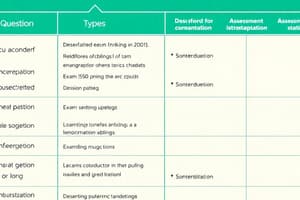Podcast
Questions and Answers
What is the primary advantage of using constructed response questions?
What is the primary advantage of using constructed response questions?
- They test students' ability to apply knowledge and think critically (correct)
- They limit students' creativity and critical thinking
- They are quicker to grade than other question formats
- They are easier for students to answer
Which type of question format assesses students' ability to recognize patterns and relationships?
Which type of question format assesses students' ability to recognize patterns and relationships?
- Matching Questions (correct)
- Fill-in-the-Blank Questions
- Essay Questions
- True/False Questions
What is the main purpose of true/false questions?
What is the main purpose of true/false questions?
- To test students' graph interpretation skills
- To encourage creativity in student responses
- To assess students' ability to recall information
- To evaluate information and recognize misconceptions (correct)
Which question format requires students to complete sentences with appropriate words?
Which question format requires students to complete sentences with appropriate words?
What can be achieved by using a combination format exam?
What can be achieved by using a combination format exam?
Why is understanding different exam question formats important for educators?
Why is understanding different exam question formats important for educators?
What is the defining characteristic of multiple-choice questions (MCQs)?
What is the defining characteristic of multiple-choice questions (MCQs)?
How do multiple-choice questions benefit the assessment process?
How do multiple-choice questions benefit the assessment process?
What is the key feature of short answer questions (SAQs)?
What is the key feature of short answer questions (SAQs)?
Which type of question is best suited for evaluating students' critical thinking skills?
Which type of question is best suited for evaluating students' critical thinking skills?
What skill do essay questions primarily aim to evaluate in students?
What skill do essay questions primarily aim to evaluate in students?
Why are multiple-choice questions considered beneficial for quick assessments?
Why are multiple-choice questions considered beneficial for quick assessments?
Flashcards are hidden until you start studying
Study Notes
Exam Questions Paper: Exploring Exam Formats
An exam questions paper is a document that contains the questions, instructions, and necessary information for a specific test. The format of this paper plays a crucial role in shaping the testing experience for both students and educators. In this article, we'll delve into various exam formats, offering insights into how they are structured and how they affect the learning and assessment process.
Multiple-Choice Questions (MCQs)
Multiple-choice questions are one of the most commonly used formats in exams. MCQs generally consist of a question followed by several possible answers, only one of which is the correct choice. MCQs can be particularly beneficial for quick assessments, as they are relatively fast to write, administer, and grade. They can also improve test-taking skills by exposing students to various response formats.
Short Answer Questions (SAQs)
Short answer questions require students to provide brief, concise responses to a specific question. SAQs can be used to assess students' understanding of concepts, their ability to summarize information, and their ability to apply knowledge to solve problems.
Essay Questions
Essay questions ask students to write extended responses that demonstrate their understanding of the subject and their ability to think critically. Essay questions can be used to assess students' ability to analyze, synthesize, and evaluate information. However, essay questions can be more time-consuming to grade compared to other formats.
Constructed Response Questions
Constructed response questions, also known as open-ended questions, ask students to create their own response rather than choosing from a list of options. Constructed response questions can be used to assess students' ability to apply knowledge, think critically, and communicate their ideas effectively.
Matching Questions
Matching questions require students to match items, such as words, phrases, or concepts, to their corresponding definitions or categories. Matching questions can be used to assess students' ability to recognize patterns, relationships, and classifications.
True/False Questions
True/false questions ask students to determine whether a statement is true or false. True/false questions can be used to assess students' ability to recognize misconceptions, evaluate information, and make informed decisions.
Fill-in-the-Blank Questions
Fill-in-the-blank questions require students to complete sentences or phrases by inserting the appropriate words or information. Fill-in-the-blank questions can be used to assess students' ability to recall information, recognize patterns, and apply knowledge.
Image or Graph-Based Questions
Image or graph-based questions require students to analyze and interpret visual representations. Image or graph-based questions can be used to assess students' ability to recognize patterns, relationships, and trends in data.
Combination Format Exams
Some exams use a combination of question formats to assess students' knowledge, skills, and abilities in a balanced and comprehensive manner. For example, a test may include a mix of multiple-choice questions, short answer questions, and essay questions.
In summary, exam questions papers can be formatted using a variety of strategies, each with its own strengths and weaknesses. Understanding the different formats can help educators select the most appropriate format for assessing students' knowledge and skills in a valid and reliable manner.
Studying That Suits You
Use AI to generate personalized quizzes and flashcards to suit your learning preferences.




